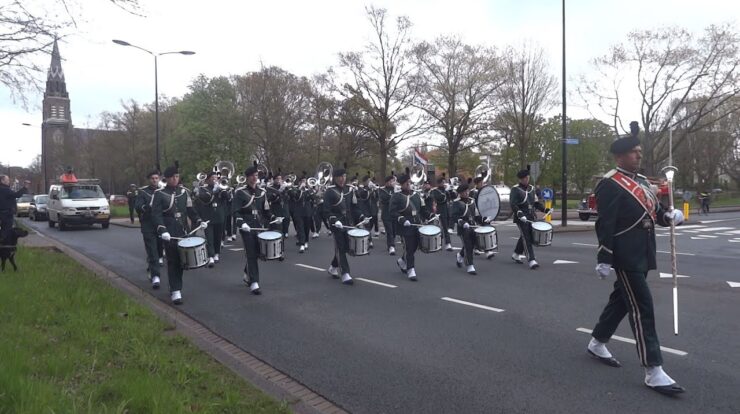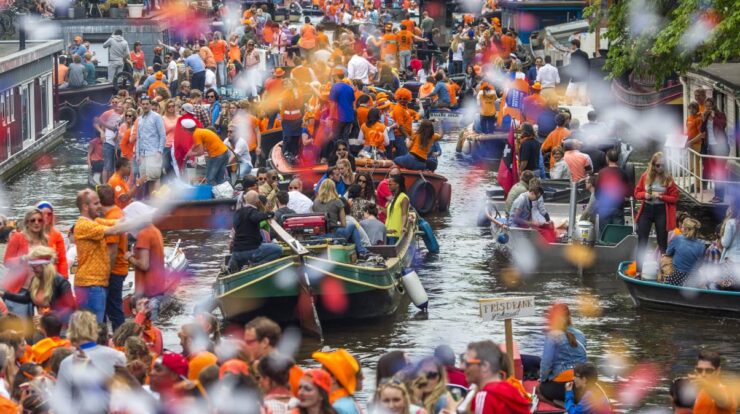
Kings Day, a vibrant celebration observed in the Netherlands and beyond, captivates hearts with its rich cultural significance, time-honored traditions, and profound social impact.
This beloved holiday, steeped in history and symbolism, unfolds with a kaleidoscope of traditions and activities, from the majestic “optocht” parade to the bustling “vrijmarkt” free market, painting the streets with an infectious energy.
Cultural Significance of Kings Day
Kings Day holds immense cultural significance in the Netherlands and other countries, embodying the nation’s history, traditions, and unity. It originated from the birthday of Queen Wilhelmina, who reigned from 1890 to 1948. After her abdication, the holiday was renamed “Koninginnedag” (Queen’s Day) and celebrated on April 30th.
In 2013, when King Willem-Alexander ascended to the throne, the holiday was shifted to April 27th and renamed “Koningsdag” (King’s Day).The symbolism of Kings Day is deeply rooted in Dutch history and culture. The orange color, associated with the Dutch royal family, is prominently displayed during the celebrations.
The day is seen as a time for unity, camaraderie, and the celebration of Dutch heritage.
Traditions and Activities
Kings Day is celebrated with a myriad of traditions and activities that reflect the festive spirit of the occasion. The most iconic tradition is the “optocht,” a colorful parade that features floats, marching bands, and performers. The parade is a spectacle of creativity and artistry, with participants showcasing their elaborate costumes and designs.Another
popular tradition is the “vrijmarkt,” a free market where people can set up stalls to sell a wide range of goods, from antiques to handmade crafts. The vrijmarkt is a bustling hub of activity, offering a glimpse into the local culture and entrepreneurial spirit.
Regional Variations
Kings Day celebrations vary across the Netherlands and other countries, reflecting the diverse cultural landscape of the region. In Amsterdam, the festivities are known for their vibrant atmosphere and large-scale events, including concerts, street parties, and boat parades. In smaller towns and villages, the celebrations are more intimate and community-oriented, often featuring traditional games and local performances.
Economic Impact
Kings Day has a significant economic impact on the Netherlands and other countries. The influx of tourists and the increased consumer spending during the holiday boost revenue in various sectors, including tourism, retail, and hospitality. The parade and other events also create employment opportunities for performers, vendors, and event organizers.
Social Impact, Kings day
Kings Day plays a vital role in fostering a sense of unity and camaraderie among communities and individuals. The shared experience of celebrating the nation’s history and culture strengthens social bonds and promotes a sense of belonging. The holiday also provides a platform for cultural exchange and the preservation of Dutch heritage.
Outcome Summary: Kings Day

As the festivities draw to a close, Kings Day leaves an enduring legacy, fostering a sense of unity and camaraderie within communities, while simultaneously showcasing the rich tapestry of Dutch culture and heritage. Its economic impact, while substantial, is intertwined with the priceless social and cultural dividends it bestows upon society.
FAQ Section
What is the significance of Kings Day?
Kings Day commemorates the birthday of King Willem-Alexander, serving as a national holiday in the Netherlands and a celebration of Dutch culture and heritage.
What are some unique traditions associated with Kings Day?
The “optocht” parade features floats adorned with vibrant colors and intricate designs, while the “vrijmarkt” free market offers a lively atmosphere for buying and selling second-hand goods.
How does Kings Day contribute to the economy?
Kings Day generates significant revenue through tourism, retail sales, and other sectors, providing a boost to the Dutch economy.
